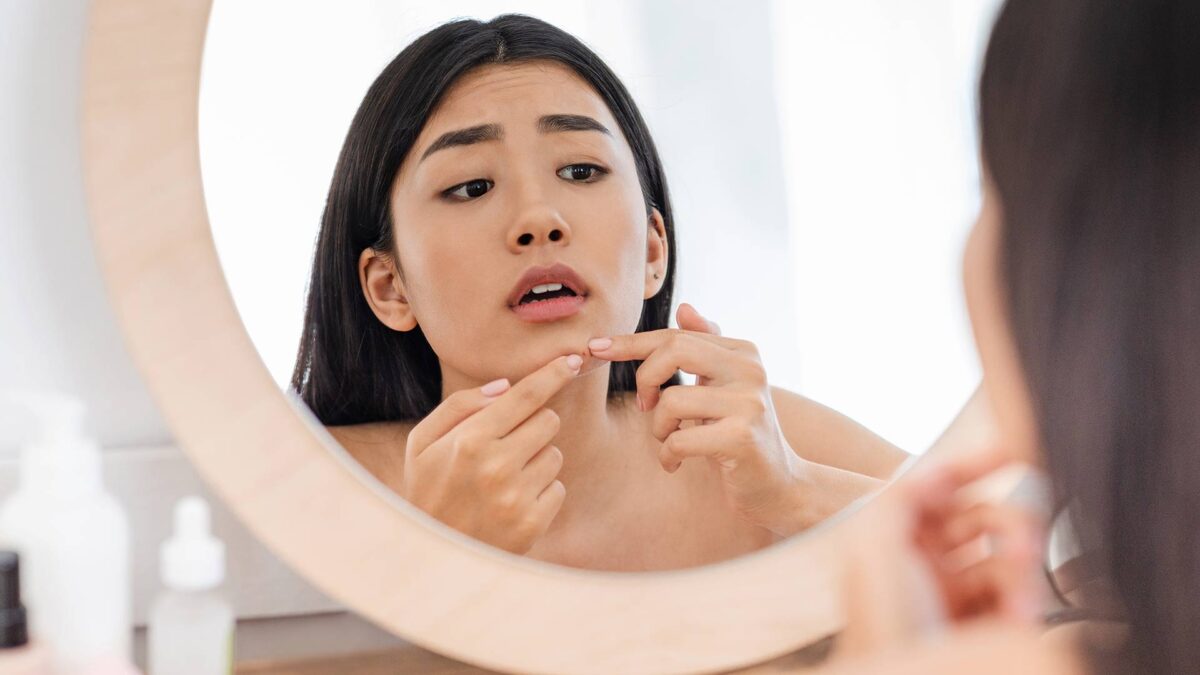Are you tired of your face shimmering like a disco ball by midday? Does the constant battle against excess shine have you feeling defeated? Well, fear not, because we’ve uncovered the secret culprits behind that greasy complexion!
In this blog post, we’ll delve into the sneaky causes of oily skin that might be hiding in plain sight. From surprising lifestyle habits to skincare tips and misconceptions, get ready to bid farewell to excessive sebum production and say hello to a fresh-faced glow.
So grab your blotting papers and let’s dive right in!
Table of Contents
1. Hormones
The first possible cause of oily skin is hormones. When our hormones are out of balance, they can wreak havoc on our smooth skin. Hormones can be out of balance for a variety of reasons, including during puberty, pregnancy, menopause, and perimenopause.
If you suspect your hormones are to blame for your oily skin, talk to your doctor about getting your hormone levels checked. Some natural adult acne treatments can help to balance hormones, such as taking adaptogenic herbs or supplements like evening primrose oil or black cohosh.
2. Stress
Stress is one of the most common causes of oily skin. When you’re stressed, your body produces more of the hormone cortisol. Cortisol signals your sebaceous glands to produce more oil, which can lead to clogged pores and breakouts.
There are a few things you can do to manage stress and keep your skin looking its best. First, try to identify the sources of stress in your life and find ways to eliminate or reduce them. Second, make sure you’re getting enough sleep and exercise, both of which help reduce stress levels.
Consider trying relaxation techniques such as yoga or meditation.
3. Poor Diet
Many different factors can contribute to oily skin, and one of them is diet. Eating a diet that is high in processed foods, sugar, and unhealthy fats can cause the skin to produce more oil than usual. This can lead to clogged pores, breakouts, and a generally unhealthy appearance.
To help control oily skin, it is important to eat a healthy diet that is rich in fruits, vegetables, and whole grains. These foods provide the skin with the nutrients it needs to function properly and stay healthy.
Eating plenty of water throughout the day will also help keep the skin hydrated and less likely to produce excess oil.
4. Genetics
Oily skin can be caused by genetics. If your parents or grandparents had oily skin, you may be more likely to have it as well. There isn’t anything you can do to change your genes, but you can take steps to manage your oily skin.
If you have oily skin, it’s important to cleanse your face twice a day and use a light, oil-free moisturizer. You may also need to use an astringent or toner to help control oil production. Be sure to avoid using products that are harsh or drying, as they can irritate your skin and make your oiliness worse.
5. Overwashing
If you’re washing your face more than twice a day, you may be overdoing it. Washing too often can strip the skin of its natural oils, leading to an increase in sebum production. This can cause the pores to become clogged, leading to breakouts.
6. Medications
Medications are a common cause of oily skin. Many medications, such as birth control pills, can increase hormone levels, which can lead to an increase in oil production. Other medications, such as steroids, can also cause oily skin.
If you are taking any medication that is causing your skin to be oily, talk to your doctor about other options.
7. Pollution and Environmental Factors
Oily skin can be caused by pollution and other environmental factors. Pollution can clog pores and lead to excess oil production. Other environmental factors, such as weather and humidity, can also affect the skin’s oil production.
If you live in a city, you may be more prone to oily skin because of the pollution in the air. Pollution can clog pores and lead to excess oil production. To help combat this, make sure to clean your face well every night and use a good quality facial cleanser that will remove all impurities from your skin.
You may also want to invest in a good quality facial brush that will help exfoliate your skin and remove any dirt or pollution that may be trapped in your pores. Other environmental factors that can cause oily skin include weather and humidity.
If it’s hot and humid outside, your skin may produce more oil than usual. To help control oily skin in these conditions, make sure to visit the acne treatment center near you. Also, try to keep your face as clean as possible and avoid touching it too much throughout the day.
8. Skincare Products
Several skincare products can cause oily skin, even if they’re marketed as being beneficial for oily skin types. For example, many face washes and cleansers contain harsh chemicals that strip the skin of its natural oils.
This can trigger the sebaceous glands to produce even more oil in an attempt to replenish the lost moisture. Similarly, using too much astringent or toner can also dry out the skin, leading to increased oil production.
Other skincare products that can cause oily skin include moisturizers and sunscreens that are heavy or greasy, as well as makeup removers that contain alcohol or other drying agents.
Even some so-called “oil-free” products can make the problem worse by clogging the pores and trapping oil beneath the surface of the skin. So be sure to read labels carefully and test products on a small area of your skin before using them all over your face.
Explore the Causes of Oily Skin Today
Oily skin can be a nuisance, but it is important to know the underlying causes behind this issue so that you can better manage it.
We hope that these 8 sneaky causes of oily skin have helped you identify what may be causing your issues with excessive oiliness and given you some tips on how to reduce its impact. With proper care and attention, anyone can keep their skin looking healthy and beautiful!
Did you find this article helpful? Check out the rest of our blogs!
Related posts
When was the first presidential election in the US?
The election process in the world’s most powerful nation, the US, has come a long way. Various amendments have been made to the Constitution that allowed black men, white women and other disadvantaged groups to participate in the elections. Further amendments during the 60s and…
Tips & Trick For Healthy Glowing Skin
Lorem ipsum dolor sit amet, consectetur adipiscing elit. Nam laoreet, nunc et accumsan cursus, neque eros sodales lectus, in fermentum libero dui eu lacus. Nam lobortis facilisis sapien non aliquet. Aenean ligula urna, vehicula placerat sodales vel, tempor et orci. Donec molestie metus a sagittis…
My Fight With Depression. Concussions
Lorem ipsum dolor sit amet, consectetur adipiscing elit. Nam laoreet, nunc et accumsan cursus, neque eros sodales lectus, in fermentum libero dui eu lacus. Nam lobortis facilisis sapien non aliquet. Aenean ligula urna, vehicula placerat sodales vel, tempor et orci. Donec molestie metus a sagittis…
Top 10 most visited tourist places in the world
Lorem ipsum dolor sit amet, consectetur adipiscing elit. Nam laoreet, nunc et accumsan cursus, neque eros sodales lectus, in fermentum libero dui eu lacus. Nam lobortis facilisis sapien non aliquet. Aenean ligula urna, vehicula placerat sodales vel, tempor et orci. Donec molestie metus a sagittis…
How Digital Health Technology Is Beneficial?
Digital health revolves around the usage of diverse technological platforms including mobile health, teen health, configurable remote patient monitoring, etc to improve the connection between the patients and the doctors. Across the healthcare system, the horizon and scope of digital health have helped create opportunities…
How Latest Farmtrac Tractors are Improving Farming in India?
India mostly relies on farming, and a large part of the population depends on it for their livelihoods. Recently, there’s been a big shift towards using modern farming techniques and machinery to make farming more productive and efficient. A good example of this is the…
Dispelling Myths: Demystifying Rx Waste and Expiration Dates – WasteX Pharmaceutical Waste Disposal Separates Fact from Fiction
The specter of “expired” medication looms large, conjuring images of potent chemicals wreaking havoc on water sources and ecosystems. But before you panic toss that bottle of pills, let’s delve into the truth about pharmaceutical waste and expiration dates, separating fact from fiction. At WasteX…
Sustainable Living in Memphis: Green Initiatives and Eco-Friendly Hotspots
Memphis, a city known for its rich cultural heritage and vibrant atmosphere, is increasingly becoming a hub for sustainable living. As environmental awareness continues to grow, residents and businesses in Memphis are embracing green initiatives and fostering eco-friendly practices. Let’s explore the city’s commitment to…
Today's pick
Hot topics
Stay connected
Meet the Author

Gillion is a multi-concept WordPress theme that lets you create blog, magazine, news, review websites. With clean and functional design and lots of useful features theme will deliver amazing user experience to your clients and readers.
Learn moreCategories
- Animals (7)
- Apps & Softwares (8)
- Automotive (8)
- Beauty (8)
- Business (141)
- Cars (12)
- Cartoon (3)
- Cook (4)
- Cooking (1)
- Design (8)
- Economy (6)
- EDUCATION (25)
- Entertainment (16)
- Fashion (23)
- Fitness (2)
- Food (16)
- Gaming (51)
- Guide (20)
- Health (119)
- Home (52)
- Home improvement (12)
- Interior (3)
- Law (16)
- Life (1)
- LifeStyle (99)
- Marketing (5)
- Motivation (9)
- Movie (6)
- Movies (1)
- Music (3)
- News (8)
- Painting Art (1)
- People (15)
- Photography (7)
- Review (113)
- Services (7)
- Social Media (6)
- Sport (9)
- Sports (12)
- Style (10)
- Swimming (1)
- Tech (125)
- Travel (26)
- Uncategorized (17)
- Vape (5)
- Western (3)
- World (2)










